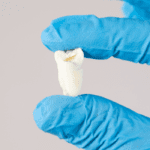Wisdom teeth are the last of your adult teeth to come out, typically erupting at 17 to 25. They grow at the back of your mouth, and most people have four: two at the top and two at the bottom.
They often grow out without a hitch. But sometimes, they don’t have enough space to grow out of, causing them to get caught in your gums or jawbone and erupt in different directions. This is a condition more commonly known as impaction. According to the Association of Oral and Maxillofacial Surgeons, there’s a nine out of ten chance of developing at least one impacted wisdom tooth.
Impacted Wisdom Teeth: Why You Need To Remove Them
A dentist can help you decide if you need to have your wisdom teeth removed. Some of the factors they consider about wisdom tooth removal include:
Your Second Molar’s Health and Condition
Your dentist will examine your wisdom tooth and how they affect your second and third molars. Wisdom teeth can grow in different angles and directions; some grow straight, and others grow sideways and rub against your other teeth. Your dentist won’t remove your wisdom teeth if they’re not affecting your other teeth.
Teeth Crowding
Crowding is a major reason for wisdom teeth removal. It makes cleaning between your teeth more difficult and can lead to further oral health issues. However, most people don’t have any problems with it. If it’s causing you problems, discuss it with your dentist so they can create the best treatment plan for you.
Pain
People have different pain levels. Some people can tolerate the pain of their wisdom teeth emerging, while others find it too painful.
Age and Overall Health
Most dentists recommend wisdom tooth removal in your late teens because the roots have not fully formed and are attached to the gums. Extracting them will be easy and less painful. Your dentist will also need to know if you have any underlying conditions or medications so they can safely and correctly remove your wisdom teeth.
Gum Health
Your dentist will also check for any gum problems related to your impacted wisdom teeth. Your dentist may decide to remove your wisdom teeth if it’s causing gum health problems.
Impacted Wisdom Teeth: Symptoms and Complications
An impacted wisdom tooth can either break through your gums or stay trapped in your jaw. Whichever one of these two situations happens, some of the symptoms you may experience are:
- Jaw pain and swelling
- Chewing difficulties
- Foul taste in the mouth
- Bleeding and swelling gums
- Bad breath
Impacted wisdom teeth can make your teeth sensitive and difficult to clean. It also increases the risk of food and debris getting stuck between your teeth and gums.
Impacted wisdom teeth complications you may experience if you ignore them include:
- Tooth decay
- Plaque buildup and cavities
- Cysts
- Gum disease
- Damaged molars
If you experience these problems, you may need your wisdom teeth removed.
Wisdom Teeth Extraction: What to Expect
Wisdom teeth extraction is a common oral surgery procedure that helps keep your other teeth safe. Here are some of the things you can expect during the surgery:
Before Extraction
Your dentist may refer you to an oral surgeon who will examine your wisdom teeth, take X-rays, locate them, and discuss sedation options based on your needs.
They will also evaluate your medical history; tell them about any medication or supplements you’re taking.
During Extraction
The duration of the extraction varies. Most last less than an hour, while more complicated cases might take longer. After administering the necessary sedation medication, your surgeon will apply local anesthesia to numb your gums and teeth. Then, they will make incisions to access the wisdom tooth. Once it’s visible, your surgeon will gently loosen and pull it from its socket, clean the area, and stitch up the incisions.
After Extraction
The stitches will fall off or dissolve on their own after a few days.
Expect some mild discomfort, slight bleeding, and swelling after the procedure. Your oral surgeon will give you aftercare instructions that can help ease them. Once the sedation has sufficiently worn off, ask a friend or family member to take you home.
Does Wisdom Teeth Removal Have Risks?
While most dental procedures like wisdom tooth removal are safe, they carry the potential risk of the following complications:
Infection
Infections occur when bacteria, food, and other debris get stuck in your tooth’s socket. Your oral surgeon may prescribe antibiotics to treat an infection.
Dry Sockets
Dry sockets occur when the blot clot in your tooth socket is dislodged early, exposing your bone.
Damage to Nearby Structures
Sometimes, a wisdom tooth extraction can damage nearby structures like nerves, jawbone, and sinuses. Modern dental techniques have helped reduce the likelihood of injuring these structures, but they can still happen. They may require additional oral surgery to fix.
Wisdom Teeth Extraction: Aftercare
Your gums will take a few weeks to heal, but most people already feel comfortable three to four days after surgery. To keep you comfortable during recovery, here are some instructions that your oral surgeon may give:
Practice gentle oral care.
Continue brushing your remaining teeth as usual, but be careful in areas near the surgical site. Avoid vigorously swishing anything in your mouth to avoid dislodging the blood clot, and soak surgical areas with antimicrobial mouthwash to keep them clean.
Follow instructions.
Follow your oral surgeon’s instructions. Don’t touch the surgical site; don’t use your tongue to feel it out. Take your antibiotics, pain relievers, and other medications as directed, and use an ice pack on your face to reduce swelling.
Eat soft foods.
Ensure you have a supply of soft foods like pasta, eggs, yogurt, and pudding. You should also have cold foods like ice cream ready to help soothe the surgical site.
Don’t eat spicy, hard, or crunchy foods that can irritate your tissues, and avoid drinking from straws that can dislodge the blood clot over the surgical site.
Take a break.
You’ll need to rest after a wisdom tooth extraction, even if it seems minor compared to other surgeries.
Avoid strenuous activity 48 to 72 hours after the surgery, and rest as much as possible for the first few days. Take a few days off from school or work, especially if your work involves heavy lifting or physical labor.
Key Takeaway
An impacted wisdom tooth will show symptoms like pain, bleeding, swelling, and chewing difficulties. Dentists may consider removing them if they’re causing excruciating pain and affecting your other teeth and gums.
Wisdom tooth removal is a surgery regularly performed across the United States. It’s a preventive procedure dentists or oral surgeons perform to keep oral health problems from developing.
Follow your surgeon’s instructions regarding aftercare for faster and more comfortable wisdom teeth removal recovery.
Leave your wisdom tooth to us.
We have partnered with the best dentists in Bradenton, FL, who provide safe and effective wisdom tooth removals. Contact us and say goodbye to your impacted wisdom teeth.





